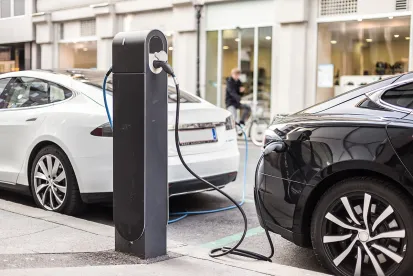Earlier this year, a new $5 Billion National Electric Vehicle Infrastructure (NEVI) Formula Program was established under the Bipartisan Infrastructure Law. The Program will provide funding to States to help with the strategic deployment of a national network of 500,000 electric vehicle (EV) charging stations by 2030, with the goal of providing convenient, reliable, affordable, and equitable charging experiences for all users.
The $5 billion will be distributed to States over five years, with $615 million available in fiscal year 2022. The funding will be apportioned among States (including the District of Columbia and Puerto Rico) on a formula basis. Under the formula, each State receives a share of program funding equal to the State’s share of the combined amount that the Federal Highway Administration (FHWA) distributes in: (i) Federal-aid highway apportionments; and (ii) Puerto Rico Highway Program funding. Excluding outliers like California and Texas (slated to receive $56 million and $60 million respectively), the Program will see an average of just less than $10 million distributed to each State in fiscal 2022.
The federal cost-share for Program projects is 80%. Private and State funds can be used to provide the remaining cost-share, and the funds can be spread further by combining them with other eligible US Department of Transportation funding for EV charging infrastructure projects if the eligibility requirements are met for both programs.
The Program limits funding to projects that are directly related to the charging of a vehicle and only for EV charging infrastructure that is open to the public or to authorized commercial motor vehicle operators from more than one company. The first year of the program will prioritize EV charging stations along designated alternative fuel corridors, particularly along the Interstate Highway System.
Under the Program, each State is required to submit an Electric Vehicle Infrastructure Deployment plan to the newly established Joint Energy and Transportation Office, which describes how the State intends to use its apportioned Program funds. States will have until August 1, 2022 to submit their plans, and the FHWA will approve eligible plans by September 30, 2022. Only States that submit a plan will be eligible for funding, and plans will be approved by FHWA on a rolling basis.
The administration has also released Program Guidance, which reflects public input received in response to a request for information, to help States begin drafting their five-year deployment plans for building the EV chargers. The Program Guidance outlines where stations should be located, general characteristics about their charging capacity, the allowable uses of funding, and how States should consider other administration priorities like equity and workplace development. It also notes that the Program will support the Justice40 Initiative, which establishes a goal that at least 40% of the benefits of federal investments in climate and energy infrastructure should be distributed to disadvantaged communities.
While the Program Guidance outlines the agencies’ priorities, States are not legally required to comply with it. However, FHWA is required to publish proposed regulations setting out minimum standards and requirements for the Program by May 13, 2022. Those regulations will provide a clearer picture regarding the technical specifications, installation, operation, and maintenance of EV charging infrastructure, as well as the Program’s labor and workforce requirements.




 />i
/>i
